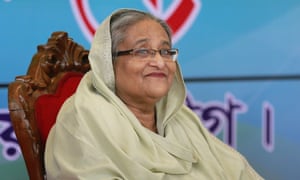
Bangladesh’s prime minister has claimed that forced disappearances allegedly perpetrated by security forces in the country also occur in Britain and the US, saying “275,000 British citizens disappeared” in the UK each year.
Human rights groups and the United Nations have both recently sounded warnings about the growing number of secret, allegedly state-sanctioned, abductions in Bangladesh.
Both major parties have been accused of human rights abuses including extrajudicial killings while in power but the Dhaka-based human rights group Odhikar claims at least 402 people have gone missing since 2009 under the Awami League administration.
In parliament on Thursday, the prime minister, Sheikh Hasina, said it was ultimately the government’s responsibility to protect people, but that Bangladesh was not the only country whose citizens sometimes vanished.
“As per statistics of 2009, 275,000 British citizens disappeared,” she said. “Of them, the whereabouts of 20,000 is not known. If you consider America, the situation is even worse.”
Hasina said Bangladesh was a developing country with 160 million people, compared with 65 million in Britain, and that in comparison with the UK and US “our situation is better”. “We are taking steps when there is any incident of disappearance,” she said.
The British figures appear to be sourced from a 2009 report in the Independentthat makes no suggestion the UK government was complicit in any disappearances.
Meenakshi Ganguly, the south Asia director for Human Rights Watch, said the Bangladesh prime minister was conflating forced disappearances with missing persons.
“Bangladesh law does not recognise enforced disappearances. It has no such notion,” Ganguly said. “The only thing they allow people to do when someone is disappeared is to file a missing persons complaint.
“Even when family members say they know it was security forces who were responsible, because there are witnesses, that complaint is not taken,” she said.
The Awami League government has denied involvement in the abductions even when victims later surface in custody.
Asaduzzamn Khan Kamal, the home minister, said earlier this month that people were faking their disappearances for personal reasons or to embarrass the government. “Some people are disappearing because they were unable to clear debts,” he said.
“Some are disappearing for some social reasons. Some disappear also after they know that they have committed serious crimes and the law enforcement agencies are trailing them.”
The most recent prominent figure to go missing in the country is Mubashar Hasan, an assistant professor at a Dhaka university whose research on terrorism has been published in leading academic journals.
Hasan’s family say they last heard from him on 7 November while he was meeting UN officials in Dhaka. He has not been heard from since and friends have told Indian media they suspect he is being held by security forces – a claim authorities deny.
A columnist and poet, Farhad Mazhar, resurfaced more than 12 hours after disappearing in July this year. He has claimed he was abducted by a group of armed men but police have cast doubt on these claims and said earlier this month they intend to sue him for making false statements.
Bangladesh’s elite Rapid Action Battalion (RAB), a special paramilitary unit, is suspected by human rights groups of involvement in most of the disappearances. In April, Swedish National Radio broadcast a secret recording in which it alleges a RAB officer admits to taking part in several killings.
More than 15 former members of the unit were among a group of 26 men sentenced to death in January for their part in a 2014 forced disappearance and murder on the orders of a low-level ruling party official.
According to a July report from HRW, about 21 of the 90 people who were secretly detained in 2016 were subsequently found dead. At least nine more remain missing. Odhikar says about 74 people have been disappeared so far this year.
Human Rights Watch has confirmed that the bodies of 21 of the more than 90 people secretly detained in 2016 were subsequently found dead with at least nine other men remaining missing.
The UN working group on enforced or involuntary disappearances in February called for the Bangladesh government to act to halt the abduction and secret imprisonment of its citizens.
The Bangladesh police chief, AKM Shahidul Haque, said earlier this month that secret abductions were an old phenomenon in the south Asian country. “Since the British colonial period, enforced disappearances have been taking place here,” he said.
Hasina’s office was contacted for comment.
Additional reporting by Shaikh Azizur Rahman in Kolkata and Mushfique Wadud in Dhaka
